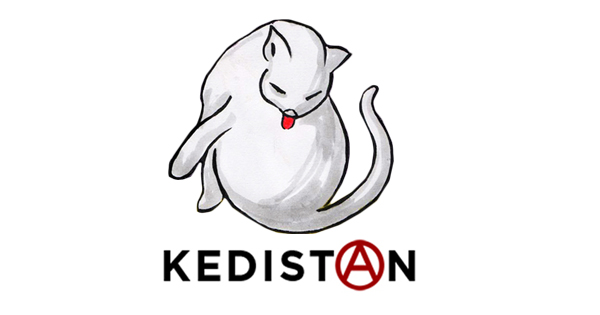Français | English
Yesterday, May 3rd, was “World Freedom of the Press Day”. On May 1st, a decree set the tone in Turkey: citizens and journalists were forbidden of producing sounds and images during public demonstrations.
May 1st demonstrations in Turkey led to 200 arrests. Not all of them filmed or documented.
Özge Uyanık, correspondent for Yol TV witnessed police violence against demonstrators while covering the May 1st demonstration in Ankara.
She was filming and recording images on her phone. The policemen noticed. Despite the fact she showed her press card and told them she worked for Yol TV, a policeman threw the journalist’s phone on the ground and stomped on it. While doing so, he hollered “why were you filming? There’s a decree!”
Fox TV Sunucusu @gulbintosun: Özel hayatın gizliliği sorunsa, bu tip müdahalelerde vatandaşın özel hayatına müdahale söz konusu. Polislerimize sesleniyorum adaletli olun, kindar olmayın. Sizler kamu görevlisisiniz. pic.twitter.com/NUK04Y9r8d
— Yol TV (@YolTV) May 1, 2021
What he called a “decree” is an anticonstitutional order, therefore illegal, published on April 27 2021, under the signature of the Director General of the police, Mehmet Aktaş, forbidding journalists or citizens of making and sharing sound recordings and videos done during public events and allowing for judicial action against them.
The order not only covers those who are filming but also those who are “suspected” of filming. It is a Minority Report type “prohibition” against freedom of the press. According to the document, sharing images done during social events would violate the right “to privacy” and, at the same time, would keep the police from performing its duty which is, no doubt, that of being allowed to persecute civilians and journalists in peace and quiet… What does “privacy” have to do with it? What is involved is work by public servants, now summarized as the exercise of violence.
Getting back to Özge, luckily or happily, her camera went on recording. Not only could she document the violences against the demonstrators but also those against her.
Özge declared on Yol TV: “As journalists we witness violences to which people are subjected. Some are thrown to the ground, kicked, some have their neck crushed underfoot… Obviously, our professional duty is to record all that.
No decree can be above the Constitution. When we film, it is as if we were performing a public duty. We are not filming people’s privacy. We will file a complaint. Moreover, jurisprudence exists on this matter. The right to inform cannot be stopped, nor that of seeking information for one’s self.”
The Bar in Ankara has initiated an action before the State Council in order to stop and annul the execution of the decree in question. The action states that “According to article 36 of the Constitution, any person is free to establish evidence through legitimate means”, adding that this type of prohibition would lead to irreparable consequences on the destruction or non-collection of evidence required in the penal justice system. “This incident signals further upcoming violations of human rights”, it adds, using as an illustration the case of George Floyd, killed by police violence in the United States.
In the United States, images recorded on a phone were precisely what documented the assassination of George Floyd and instigated the mobilizations which followed and which led to the exceptional incrimination by an American court, of a white policeman following the death of a black man. Another example, in France, where it is known that “images” lead public opinion to a feeling of “insecurity” in all circumstances, a law now exists to limit the sharing by citizens, and hence by journalists, limiting freedom of the press when it involves forceful police action against public demonstrations. In this case, one can wonder who, of Turkey or of France, copied the other.
Of course, in Turkey, this type of practice is nothing new. Just are the use of police and military violence and the control over media. What is remarkable is the fact that more and more so-called “democratic” countries are imitating it. One no longer experiences a sense of “estrangement”. If only by rapidly observing the strategies of the Turkish regime, the use of media, confiscated or created as vehicles for propaganda, attempts at controlling the web and particularly social networks through threats, censorship, legal proceedings, sentencing and fines, as well as decrees and orders, one sees “universality” in this area when it comes to protecting the power of the State and of its interests…The police State thus builds up, step by step, in order to muffle protests, using the key word of “terrorism” as a banner.
Of course, it may seem ludicrous to defend formal “freedom of the press” in Turkey when so many journalists are imprisoned and where the slogan “journalism is not a crime” would be more appropriate. On this day, noting the rise of authoritarianism in Europe, its translation into actions against elementary democratic rights would already be a way of fighting against the notion spread by our extreme right movements for whom “strong power would solve the crises”,when in Turkey, we can see how exactly the opposite happens as a result.
Even as a formal right, trampled by every authoritarianism, “freedom of the press” must be defended tooth and nail, including now in its digital versions and on private networks that go under the name of social ones. Social networks can be considered a powerful means of expression and orientation, and a possible vector for democratic expression.
This is why both laws on “global security” and decrees in Turkey must draw attention to the way States treat freedoms of the press, of expression and of thought, and why the control of information and of its free circulation must be fought against.






